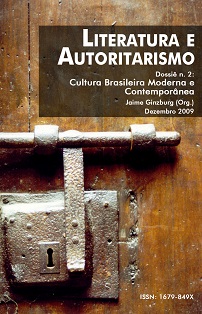Haunted homes and desert landscapes: the sites of memory in latin american postdictatorship fiction
DOI:
https://doi.org/10.5902/1679849X74665Keywords:
Military dictatorship, Repression, Memory, Literature, Plastic artsAbstract
How do contemporary Latin American authors and artists represent the harrowing memory of the military dictatorships? How does art and literature account for the confluence of private and public memory of authoritarianism, between individual and national trauma? And finally, how do narrative and pictorial discourses reconcile – or at least acknowledge – the diverging accounts of the past? This essay first briefly examines representations of the brutality of Latin America’s authoritarian regimes in the plastic arts. It will consider how artists such as Iván Navarro (Chile), Fernando Traverso (Argentina), Cildo Meirelles (Brazil) and Luis Camintzer (Uruguay) work with everyday objects to broach the issues of oppression and recollection. This discussion will then segue into an analysis of two recent novels, one from Brazil, Fernando Bonassi’s Prova contrária (2003) and another from Chile, Carlos Franz’s El desierto (2005), that recover the threads that associate history (i.e. public recollection) to memory (this is, private remembrance); the past to the present.
Downloads
References
AGAMBEN, G. Homo Sacer: Sovereign Power and Bare Life. Palo Alto: Stanford UP. 1998.
AUGÉ, M. Non-Places. Introduction to an Anthropology of Supermodernity. London, New York: Verso. 1995.
AVELAR, I. The Untimely Present: Postdictatorial Latin American Fiction and the Work of Mourning. Durham: Duke UP. 1999.
BONASSI, F. Prova contrária. Rio de Janeiro: Objetiva. 2003.
BRESNAHAN, R. “Introduction: Chile Since 1990 the Contradictions of Neoliberal Democratization.” Latin American Perspectives, v.30, n.5, p.3-15. 2003.
CAMINTZER, L. Catalog Entry. In: L. Reuter (Ed.). Los desaparecidos/The Disappeared Catalog. Milan: Charta, 2006. Catalog Entry, p. 82-85.
DÉOTTE, M. “Desaparición y ausencia de duelo”. In: N. Richard (Ed.). Políticas y estéticas de la memoria. Santiago: Cuarto propio, 2000. p.93-97.
FRANCO, J. The Decline and Fall of the Lettered City. Latin American in the Cold War. Cambridge: Harvard UP. 2002.
FRANZ, C. El desierto. Buenos Aires: Sudamericana. 2005.
FRAZIER, L. J. Salt in the Sand. Memory, Violence, and the Nation-State in Chile, 1890 to the Present. Durham: Duke UP. 2007.
HOLSTON, J. Insurgent Citizenship. Disjunctions of Democracy and Modernity in Brazil. New Jersey: Princeton UP. 2008.
JAMESON, F. Postmodernism, or, the Cultural Logic of Late Capitalism. Durham: Duke UP. 1991.
JELIN, E. State Repression and the Labors of Memory. Minneapolis: U of Minnesota P. 2003.
KLEIN, N. The Shock Doctrine. The Rise of Disaster Capitalism. New York: Metropolitan Books. 2007.
KOONINGS, K. “Shadows of Violence and Political Transition in Brazil: From Military Rule to Democratic Governance. In: K. Koonings and D. Kruijt (Ed.). Societies of Fear. The Legacy of Civil War and Terror in Latin America. London: Zed Books, 1999. 199-234.
KRUJIT, D. e K. Koonings. “Introduction: Violence and Fear in Latin America.” In: K. Koonings and D. Krujit (Ed.). Societies of Fear. The Legacy of Civil War, Violence and Terror in Latin America. London: Zed Books, 1999. 1-30.
LAZZARA, M. J. Chile in Transition. The Poetics and Politics of Memory. Gainesville: UP of Florida. 2006.
RICHARD, N. Resíduos y metáforas: Ensayos de crítica cultural sobre el Chile de la transición. Santiago: Cuarto propio. 1998.
RICHARD, N. “Introducción”. In: N. Richard e A. Moreiras (Ed.). Pensar en/la postdictadura. Santiago: Cuarto Propio, 2001. 9-20.
STERN, S. Battling for the Hearts and Minds. Memory Struggles in Pinochet’s Chile, 1973-1988. Durham: Duke UP. 2006.
STERN, S. Remembering Pinochet’s Chile On the Eve of London 1998. Durham: Duke UP. 2006.
Downloads
Published
How to Cite
Issue
Section
License
DECLARAÇÃO DE ORIGINALIDADE E EXCLUSIVIDADE E CESSÃO DE DIREITOS AUTORAIS
Declaro que o presente artigo é original e não foi submetido à publicação em qualquer outro periódico nacional ou internacional, quer seja em parte ou na íntegra. Declaro, ainda, que após publicado pela Literatura e Autoritarismo, ele jamais será submetido a outro periódico. Também tenho ciência que a submissão dos originais à Literatura e Autoritarismo implica transferência dos direitos autorais da publicação digital. A não observância desse compromisso submeterá o infrator a sanções e penas previstas na Lei de Proteção de Direitos Autorais (nº 9610, de 19/02/98).






